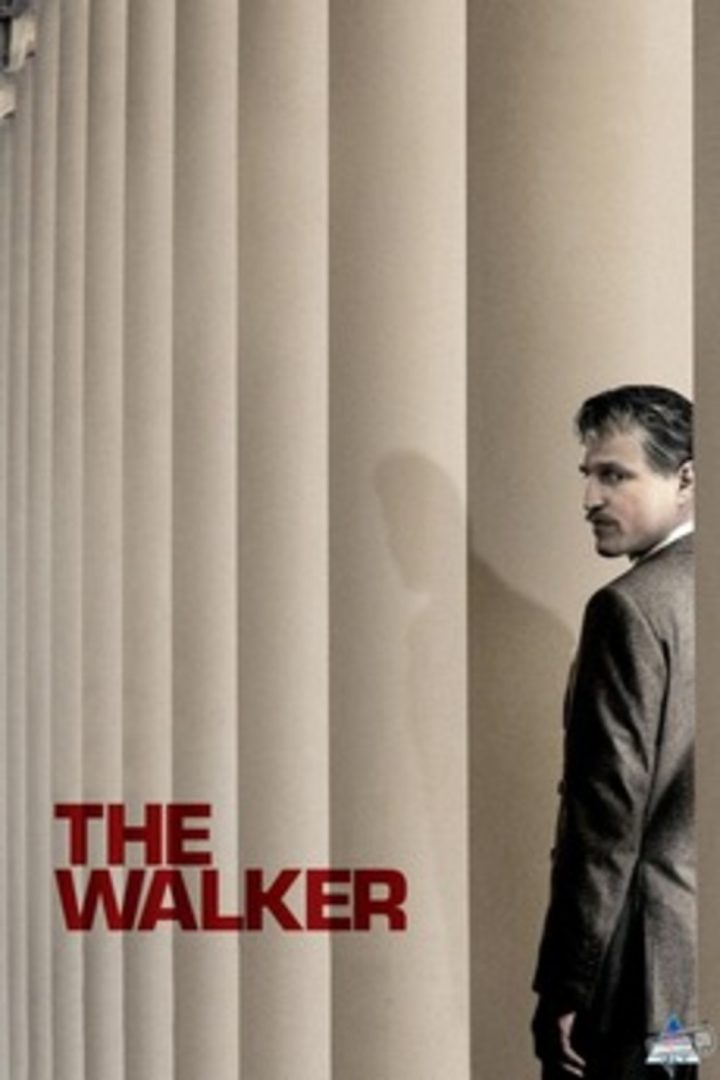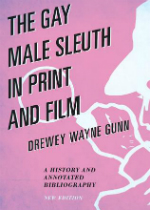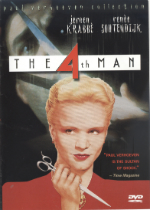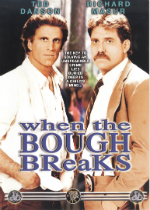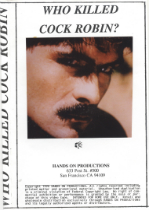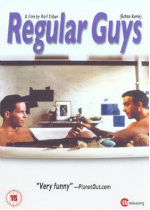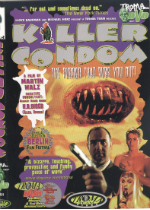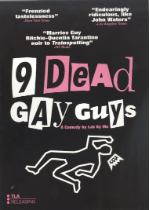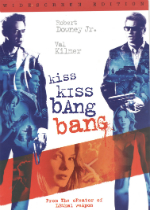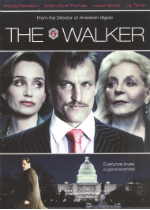GunnShots: Top 10 Gay Crime Films
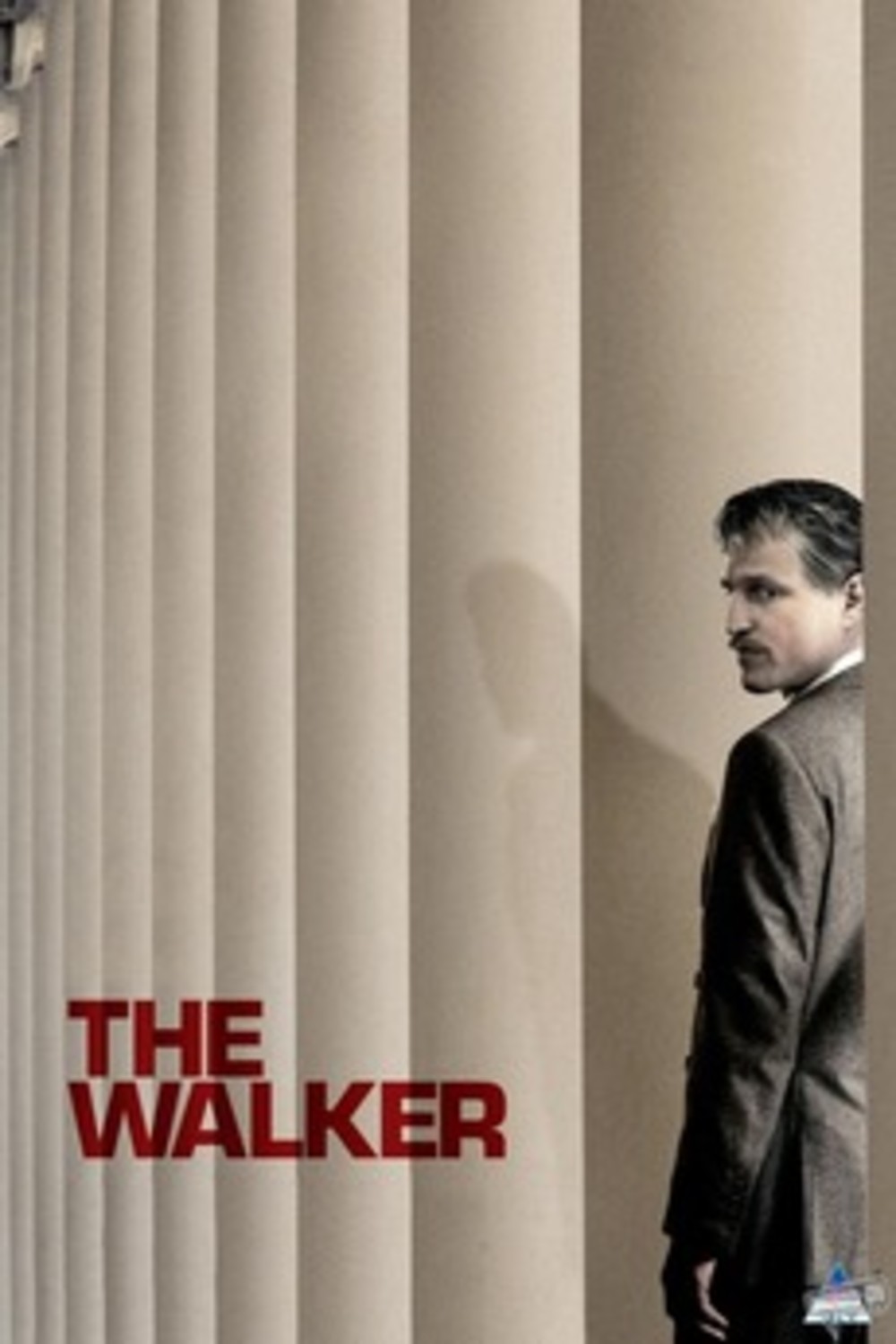
Author: Drewey Wayne Gunn
January 16, 2013
When friends, including mystery writers, learned that I was compiling my list of the ten best gay film mysteries, several expressed surprise that I could find that many. Actually, my problem was narrowing down the enormous number of possibilities. The new edition of my book The Gay Male Sleuth in Print and Film (Scarecrow Press, November 2012) lists some 130 titles for me to choose from, 1948-2011, this number including only films with some kind of a gay investigator. In addition to these, I could also consider, though I decided not to, any number of television and video serials, such as episodes from Dalziel and Pascoe, 1996-2002, and the powerful miniseries The State Within, 2006. Plus, there are over 100 pornographic films that I also eliminated, though some are of surprising interest, from Greek Lightning, 1973, and The American Adventures of Surelick Holmes, 1975, through The Roommate, 1993, to Focus/Refocus, 2009.
Then there are crime films in which gays have roles other than as investigators, but I decided to abide by the parameters I established for my book and eliminated all films in which homosexuals serve only as weak, hapless victims or as murderous criminals. That lets me off the hook having to decide about such widely diverging films as Suddenly Last Summer, 1959; The Detective, 1968; Cruising, 1980 (even though it is not at all the film that we thought it was when it came out); Blood and Concrete, 1991. I still had too many films on my initial shortlist. I started rewatching them all. Here are the ten that emerged for varying reasons as my top choices. They are listed in chronological order, beginning with the movie that paved the way for the others and ending, purely by chance, with (for me) the best of them all.
# 1
Victim. Allied Film Makers, August 1961. Young Jack Barrett (Peter McEnery) hangs himself in his jail cell rather than risk revealing his emotional relationship with a closeted London barrister, Melville Farr (Dirk Bogarde). Jack is in custody because he stole from his employer in order to pay off blackmailers who have an incriminating photograph of the two. The married Farr, ridden by guilt that he refused to take the youth’s frantic telephone calls, risks his marriage and his career by striking back. In orthodox fashion, clues are fairly presented to viewers, red herrings occur, and the chief perpetrator is something of a surprise. The script, however, was written in deliberate support of the Wolfenden report and now suffers from its propagandistic mission. One must watch through historical lens (among other things, it was the first time filmgoers heard the word “homosexual” in a movie house), but largely because of Bogarde, it still packs a punch. § Screenplay by Janet Green and John McCormick, directed by Basil Dearden. William Drummond wrote a novelization, in which the barrister’s name is changed to Melville Carr (Corgi, 1961). John Colstream has published a history of the making of the film for the British Film Institute Classics series (Palgrave Macmillan, 2011). IMDb rating: 7.7.
# 2
De Vierde Man (The Fourth Man). Verenigde Nederlandsche Filmcompagnie, March 1983. Dutch novelist Gerard Reve (Jeroen Krabbé) allows himself to be seduced by Christine Halsslag (Renée Soutendijk), whom he meets at a reading/lecture, in order to seduce, in turn, her lover Herman (Thom Hoffman), with whom he has become infatuated after a chance meeting. Through a series of discoveries, Gerard becomes convinced that Christine has murdered three husbands. Who will be her fourth victim, Gerard or Herman? Beginning with Gerard’s imaginary murder of his boyfriend at home, nothing is certain in this brilliant film, however; perhaps Gerard has invented most, if not all, of the plot. Or perhaps not. Religious, sexual, funereal, and nature imagery fill the screen with the hallucinatory quality of some fairy tale, pushing the viewer to ponder the meaning of mystery in all its senses. § Screenplay by Gerard Soeteman, based on Gerard Reve’s untranslated novel (1981), directed by Paul Verhoeven. English subtitles by Helen Eisenman. Recipient of multiple awards. IMDb rating: 7.2.
# 3
When the Bough Breaks. NBC-TV, 10 October 1986. A heterosexual child psychologist, Alex Delaware (Ted Danson), takes down a ring of rich pedophiles who find their victims in a supposed safe house that they have endowed for troubled children. But Alex has been brought into the case by gay LAPD detective Milo Sturgis (Richard Masur), and, throughout, Milo, ironically enough, provides psychic stability for the volatilely obsessed Alex. Moreover, it is Milo who saves Alex in the chilling climax to this taut thriller. NBC is to be credited for showcasing a faithful adaptation of the award-winning novel by Jonathan Kellerman (1985), including a cameo appearance by Milo’s domestic partner, Dr. Rick Silverman (Scott Paulin), complete with a kiss. NBC’s courage is all the more remarkable in that this same year the U.S. Supreme Court ruled states had the right to criminalize same-sex relationships and Cardinal Joseph Ratzinger (the present Pope Benedict XVI) condemned any church support of the “homosexual condition.” § Screenplay by Phil Penningroth, based on Kellerman’s novel, directed by Waris Hussein. Winner of the Edgar Award for best television feature. IMDb rating: 7.7.
# 4
Who Killed Cock Robin. Hands On Productions, 1990. San Francisco homicide detective Sgt. Henry Magdelena (Matthew McQueen) investigates the murders of a series of gay porn stars. Historically, the film is important for being the first to have an openly gay police officer as its protagonist (Milo has a secondary role), but, admittedly, I am indulging myself in listing it as one of the ten best. Still, rough-hewed as it is, it possesses a certain wit and charm, not least in the romance between Magdelena and an aspiring, albeit self-deluded actor, Michael Magillis (Jeff Wesland). The film features a virtuoso performance by Larry Maraviglia as a movie historian and an over-the-top parody of a porn star by Kevin Glover. Replete with allusions both to great movie mysteries, particularly Alfred Hitchcock’s, and to porn films (though there is nothing pornographic about the movie itself), it more than deserves rediscovery from the almost complete oblivion into which it has fallen. § Screenplay by director David Stuart. Not listed on IMDb.
# 5
Echte Kerle (Regular Guys). Bayerischer Rundfunk, May 1996. Straight Frankfurt police inspector Christoph Schwenk (Christoph M. Ohrt), a male chauvinist, through a tortuous chain of circumstances ends up sharing an apartment and sometimes a bed with a gay car thief, Edgar Sänger (Tim Bergmann). All the time he is on a stakeout with his partners (Oliver Stokowski and Carin C. Tietze) trying to catch a car-jacking ring. As a result of their interactions with Edgar, all three cops gain insight into themselves and consequently change in positive ways. It is a major spoiler to say more, as this charming comedy moves to a rather unexpected but altogether satisfying ending. § Screenplay by Rudolf Bergmann and director Rolf Silber. English subtitles by Chris Doherty. IMDb rating: 6.9.
# 6
Kondom des Grauens (The Killer Condom). Ascot Films, August 1996. Noir meets satire, comedy, and a bit of science fiction. A genetically engineered creature designed to look like a contraceptive is biting off johns’ penises in New York’s Hotel Quickie. NYPD detective Luigi Mackeroni (Udo Samel), the narrator — a son of Sicily who has a love/hate attitude to the city — is assigned the case. Even after Mackeroni loses one of his testicles (the creature luckily misses its real object) while going undercover, so to speak, with young hustler Billy Bullcock (Marc Richter), his police chief refuses to believe such a creature could exist. It takes a political scandal — a Republican presidential candidate loses his penis while cavorting in the bathtub with his mistress — to force him to accept that Mackeroni is on the right path. The trail leads to a religious fanatic who wishes to destroy Sodom and Gomorrah before the return of the Lord to New York City on the 11:30 flight from Rome on December 31, 1999. Mackeroni receives help from former policeman Bob Miller, aka the drag queen Babette (Leonard Lansink), whose advances he fends off, and from Billy, with whom he falls in love. § Screenplay by Ralf König and Martin Walz, adapted from two graphic novels by König (1988, 1990), both of which have been translated: The Killer Condom (Catalan Communications, 1992) by J.D. Steakley and Down to the Bone (Ignite! Entertainment, 2011) by Jeff Krell. The screenplay was also published (1996) but has not been translated. English subtitles by an unlisted translator. IMDb rating: 5.3.
# 7
Velvet Goldmine. Channel 4, October 1998. Bisexual glam-rocker Brian Slade (Jonathan Rhys Meyers) disappears after his 1974 stage assassination is revealed as faked. Then ten years later (the year of George Orwell’s novel), New York Herald reporter Arthur Stuart (Christian Bale) is assigned to find out what happened to him. It turns out that Arthur was formerly one of Brian’s groupies who has lost his own way and is now a kind of missing person himself. Can he, as a result of his investigation, reclaim his own integrity and his spiritual heritage, as symbolized by an emerald passed on from Oscar Wilde? With Ewan McGregor and Micko Westmoreland as two other bisexual musicians, the film is brilliant and complex, and the soundtrack is wicked. § Screenplay by James Lyons and director Todd Haynes. The screenplay was published (Miramax Books, 1998), and the producer, Christine Vachon, included an account of making the film in Shooting to Kill (Perennial, 1998). IMDb rating: 6.8.
# 8
9 Dead Gay Guys. Little Wing Films, September 2003. Part murder mystery, mostly caper, this politically incorrect outing remains funny upon repeated viewings. A clueless Kenny (Glenn Mulhern) arrives in London believing his best mate, Byron (Brendan Mackey), the narrator, has told him the truth about the opportunities available there for poor Irish lads. He finds instead that Byron is a small-time hustler — gay for pay. Fate intervenes in the murder of the Queen (Michael Praed) with a cattle prod, the very weapon Byron has lifted in a backroom from a guy with “a three and a half inch willy,” thinking it was his money cache. They initially search for the murderer, but segue into trying to locate the home of the Queen’s lover, Golders Green (Simon Godley), in order to lift his stash of money. Eight more deaths occur, two of them the inadvertent fault of Kenny’s emerging sexuality. § Screenplay by director Lab Ky Mo. The film received the audience award at the Dublin Gay & Lesbian Film Festival. IMDb rating: 6.2.
# 9
Kiss Kiss Bang Bang. Warner Brothers, September 2005. Harry Lockhart (Robert Downey Jr.), the heterosexual narrator, a petty thief, mistakenly gets sent to Hollywood to play the role of a private investigator. One of his acting coaches is L.A. private investigator Perry Van Shrike, aka Gay Perry (Val Kilmer). Perry takes his protégé along for what he expects to be a boring evening of surveillance work, only for the two of them to witness a murder. Harry’s childhood friend Harmony Lane (Michelle Monaghan) discovers her sexually abused sister is involved somehow. She hires first Harry (who she thinks is a real P.I.) and then Perry to investigate. The results are a comic thriller that delivers laughs even the third time around. I hesitated to include the film in my top list since Perry is the only open gay in sight. But given his remarkable (and non-stereotypical) role as tutor, role model, and finally friend to the straight small-time loser, I could not resist. § Screenplay by director Shane Black, based in part on the totally non-gay novel Bodies Are Where You Find Them (1941) by Brett Halliday. IMDb rating: 7.7.
# 10
The Walker. Kintop Pictures, August 2007. Carter Page III (Woody Harrelson), an old-style Southern homosexual residing in the District of Columbia, becomes a problem when powerful interests try to manipulate a lobbyist’s murder to their advantage. Carter tenaciously protects the lobbyist’s mistress, his longtime friend Lynn Lockner (Kristin Scott Thomas), a Senator’s wife. When Carter’s journalist lover, Emek Yoglu (Moritz Bleibtreu), starts investigating, both men are physically threatened. At the same time, Carter, who serves as a safe escort for married women whose husbands do not want to accompany them to social functions (a “walker”), finds Washington’s society doors shutting against him. Such a summary barely hints at the complex, nuanced texture of this brilliant, star-studded film. It seems even richer watching it in the political climate of fall 2012 than it did when it first came out. The heart of the film, however, remains Carter’s confrontation, like that of so many gay sleuths, with the truth that the ultimate mystery is his own identity. § Screenplay by director Paul Schrader. IMDb rating: 5.9.
* * * * *
Some things disappoint me about my final list. I had hoped it would include more low-budgeted independent films, such as works by Robert Gaston, Paul Bright, John Huckert, Scott King, Tommy Stovall. I would have liked to see one of Ron Oliver’s works on it. I thought for sure Ben Taylor’s In the Flesh, 1998, would make the list, but it did not match up to the ones above despite representing the genre in its purest form. None of the many Spanish-language contenders is here. Nor did any Italian film made it, despite the fact that the first openly gay private investigator in a major film was a cameo role in Dario Argento’s giallo thriller 4 mosche di velluto grigio (Four Flies on Gray Velvet), 1971. I hope that my choices, both omissions and inclusions, will provoke a strong enough reaction to get some response from readers. I very much want to hear others’ thoughts about the genre.
The Gay Male Sleuth in Print and Film
by Drewey Wayne Gunn
Scarecrow Press
Hardcover, 9780810885882, 442 pp.
November 2012
The Fourth Man
Anchor Bay Entertainment, 2001
Color, 102 min.; subtitles; audio commentary
ASIN: 6305972915
The Killer Condom
Troma Entertainment, 2000
Color, 107 min.; subtitles; audio commentary; other features
ASIN: B00000K3TJ
Kiss Kiss Bang Bang
Warner Home Video, 2006
Color, 103 min.; closed captions; audio commentary
ASIN: B000F5GNX8 / B000H1RFKA (blu-ray)
9 Dead Gay Guys
TLA Releasing, 2004
Color, 83 min.; audio commentary
ASIN: B0001HAIPY
Regular Guys
TLA Releasing, 2003
Color, 100 min.; subtitles.
ASIN: B0000B1A36
Velvet Goldmine
Miramax Lionsgate, 2011
Color, 119 min.; closed captions
ASIN: B004U7MR4G / B005Q4CKJY (Blu-ray)
Victim
Home Vision Entertainment, 2012
B&W, 100 min., feature, “Dirk Bogard in Conversation”
ASIN: B00007ELDE
The Walker
ThinkFilm, 2008
Color, 108 min.; closed captions; audio commentary
ASIN: B0011B9W7E
When the Bough Breaks
Osiris Entertainment, 2010
Color, 100 min.
ASIN: B003CT356M
Who Killed Cock Robin?
Currently unavailable
Color, 108 min.
